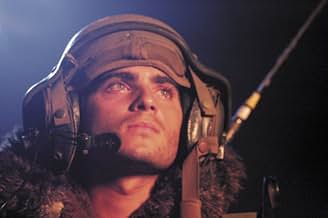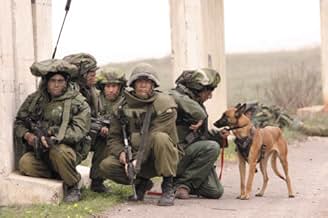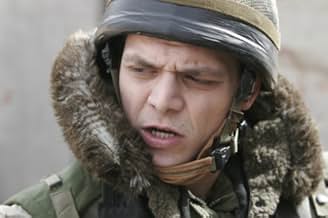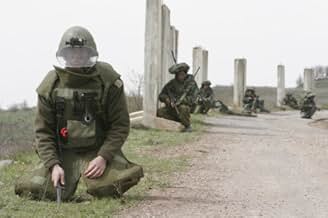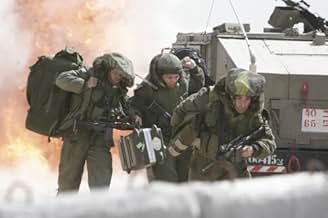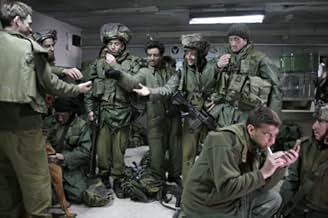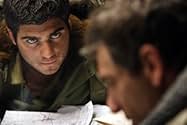AVALIAÇÃO DA IMDb
6,7/10
5 mil
SUA AVALIAÇÃO
Adicionar um enredo no seu idiomaThe story of a group of Israeli soldiers stationed in an outpost prior to the withdrawal of forces of 2000.The story of a group of Israeli soldiers stationed in an outpost prior to the withdrawal of forces of 2000.The story of a group of Israeli soldiers stationed in an outpost prior to the withdrawal of forces of 2000.
- Indicado a 1 Oscar
- 5 vitórias e 9 indicações no total
Arthur Perzev
- Yonatan Shpitzer
- (as Arthur Faradjev)
Zohar Strauss
- Rossman
- (as Zohar Shtrauss)
Ya'akov Ahimeir
- Self
- (as Yaakov Ahimeir)
- Direção
- Roteiristas
- Elenco e equipe completos
- Produção, bilheteria e muito mais no IMDbPro
Avaliações em destaque
Beaufort is an impressive israeli movie with fantastic photography and With excellent cast but some of the scenes are stuck and prolonged too Much. Beaufort is a movie that make you look on the other side of the war,of the mental and the physical side of the soldiers.it makes you understand the difficulties,dilemmas and the unbearable fear with some excellent And Impressive action scenes that makes us feel the soldier's situation in the war. This is a movie that can show the world the condition and the position of the Israelis soldiers that know the Israeli-Palestine conflict and can show the human side in the war and not only the wild and savage side.
There aren't any real winners at war but there are real injured and dead soldiers and people.This movie show you.
There aren't any real winners at war but there are real injured and dead soldiers and people.This movie show you.
It's about Israeli soldiers holding down a fort in Southern Lebanon, but it could be about soldiers anywhere. That is what makes this film so memorable.
Lebanon, Afghanistan, Bosnia, Iraq, it is all the same when it comes to politics and the soldiers that have to carry out the policies made by chickenhawks far removed from the front.
It is touching and funny at times. I could really relate to the truck arriving with fresh supplies after a long wait. It is common and a hot meal at midnight is much appreciated when you have been running low.
It shows real soldiers doing real grunt work. It is an outstanding film.
Lebanon, Afghanistan, Bosnia, Iraq, it is all the same when it comes to politics and the soldiers that have to carry out the policies made by chickenhawks far removed from the front.
It is touching and funny at times. I could really relate to the truck arriving with fresh supplies after a long wait. It is common and a hot meal at midnight is much appreciated when you have been running low.
It shows real soldiers doing real grunt work. It is an outstanding film.
Right-wing audiences have criticized "Beaufort" for being left-winged, while left-wing audiences have criticized the movie for being right-winged. Immediately that should tell you this is a movie worth watching.
Like all great war films, "Beaufort" avoids situational politics and instead focuses on the broader, universal issue of war which all sides can agree upon: war is hell. Or specifically in this case, war is pointless hell. Here we have an excellent illustration; "Beaufort" is the story of a handful of soldiers who fight admirably to defend a fort, simply so that they can abandon it as planned a few days later. Folks, it don't get any more pointless than that. I would tip my hat to the genius who came up with such a great metaphor, but the funny thing is that the story came straight out of history.
(Note: although this film depicts the Israeli withdrawal from Castle Beaufort which was returned to Lebanon in 2000, it was actually filmed at a different fortress at the Golan Heights in Syrian territory currently held by Israel.)
Joseph Cedar directs this film in a tense, claustrophobic way with narrow, labyrinthine corridors that burrow deep into the mountain. I was instantly reminded of the classic submarine film "Das Boot" and wasn't surprised one bit when I read that Cedar was highly influenced by that film. "Beaufort" shares several qualities with "Das Boot" such as the facelessness of the enemy (all we see are the incoming mortars & missiles), the youth & inexperience of the soldiers (Beaufort's commander is 22 and most of the soldiers are 18- 20 years old), and of course the constricting, suffocating feeling of being stuck in a steel tube while, outside, the powers that be are deciding your fate.
One notable difference between "Beaufort" and "Das Boot" are the infrequent but powerful shots of the gorgeous landscape, the humbling presence of the 12th century ruins, and other scenes of nature which lend a positive breath of fresh air to an otherwise dismal setting. This, I'm sure, was very deliberate on the part of the director, and at one point there's a nice speech where one soldier says to another, "This will all be a tourist attraction, and you can bring your girlfriend here and tell her this is where Outpost Green once was."
And that, to me, is what separates "Beaufort" from the standard "war is hell" stories. Regardless of how the story ends up, you get a feeling that eventually the majesty of nature will prevail--or should I say the stupidity of humans will fail. Same thing, I guess.
Peculiar highlights of this film include a powerful, sad song sung by one of the soldiers in the barracks, and one of the cutest war dogs ever. (And if, like me, you always cringe at animals being used in films that aren't regulated by the AHA or RSPCA, don't worry I don't believe there was any animal cruelty here.)
Other great (anti-)war films that focus on the psychology of the soldier rather than the action of battle include: the aforementioned "Das Boot" set entirely in a German submarine, "None But the Brave" about an American & a Japanese platoon each stranded on a remote island together, and an excellent war-drama-comedy from Korea called "Welcome to Dongmakgol" about N & S Korean enemies meeting in a remote village where none of the villagers are aware that a war is going on.
All of these great films can be viewed free of politics if you just ignore the uniforms. Both right-wingers & left wingers alike can find common ground with the universal thought (to quote ex-Marine talk radio host Kim Peterson), "the only point of war is to kill people and break things!"
Like all great war films, "Beaufort" avoids situational politics and instead focuses on the broader, universal issue of war which all sides can agree upon: war is hell. Or specifically in this case, war is pointless hell. Here we have an excellent illustration; "Beaufort" is the story of a handful of soldiers who fight admirably to defend a fort, simply so that they can abandon it as planned a few days later. Folks, it don't get any more pointless than that. I would tip my hat to the genius who came up with such a great metaphor, but the funny thing is that the story came straight out of history.
(Note: although this film depicts the Israeli withdrawal from Castle Beaufort which was returned to Lebanon in 2000, it was actually filmed at a different fortress at the Golan Heights in Syrian territory currently held by Israel.)
Joseph Cedar directs this film in a tense, claustrophobic way with narrow, labyrinthine corridors that burrow deep into the mountain. I was instantly reminded of the classic submarine film "Das Boot" and wasn't surprised one bit when I read that Cedar was highly influenced by that film. "Beaufort" shares several qualities with "Das Boot" such as the facelessness of the enemy (all we see are the incoming mortars & missiles), the youth & inexperience of the soldiers (Beaufort's commander is 22 and most of the soldiers are 18- 20 years old), and of course the constricting, suffocating feeling of being stuck in a steel tube while, outside, the powers that be are deciding your fate.
One notable difference between "Beaufort" and "Das Boot" are the infrequent but powerful shots of the gorgeous landscape, the humbling presence of the 12th century ruins, and other scenes of nature which lend a positive breath of fresh air to an otherwise dismal setting. This, I'm sure, was very deliberate on the part of the director, and at one point there's a nice speech where one soldier says to another, "This will all be a tourist attraction, and you can bring your girlfriend here and tell her this is where Outpost Green once was."
And that, to me, is what separates "Beaufort" from the standard "war is hell" stories. Regardless of how the story ends up, you get a feeling that eventually the majesty of nature will prevail--or should I say the stupidity of humans will fail. Same thing, I guess.
Peculiar highlights of this film include a powerful, sad song sung by one of the soldiers in the barracks, and one of the cutest war dogs ever. (And if, like me, you always cringe at animals being used in films that aren't regulated by the AHA or RSPCA, don't worry I don't believe there was any animal cruelty here.)
Other great (anti-)war films that focus on the psychology of the soldier rather than the action of battle include: the aforementioned "Das Boot" set entirely in a German submarine, "None But the Brave" about an American & a Japanese platoon each stranded on a remote island together, and an excellent war-drama-comedy from Korea called "Welcome to Dongmakgol" about N & S Korean enemies meeting in a remote village where none of the villagers are aware that a war is going on.
All of these great films can be viewed free of politics if you just ignore the uniforms. Both right-wingers & left wingers alike can find common ground with the universal thought (to quote ex-Marine talk radio host Kim Peterson), "the only point of war is to kill people and break things!"
Considering the sanitized pulp that the United States military participates in the filming of, it is refreshing to see a movie about soldiers that rings true and does not shy away from controversy. The IDF must also be commended for actively participating in the making of a film that does not shine the best light on the occupation of southern Lebanon.
Ultimately it is Israeli politicians and inept commanders that take the brunt of the blame for the appalling conditions the soldiers portrayed in this movie endure while holding on to their mountain top position.
Hezbollah obviously plays a part in this story, yet they are an unseen presence. They are always just out of the frame and sporadically, sometimes shockingly so, they remind everyone involved of their lethal potential.
Set aside your preconceived notions of the Israeli-Arab conflict and see this movie.
Ultimately it is Israeli politicians and inept commanders that take the brunt of the blame for the appalling conditions the soldiers portrayed in this movie endure while holding on to their mountain top position.
Hezbollah obviously plays a part in this story, yet they are an unseen presence. They are always just out of the frame and sporadically, sometimes shockingly so, they remind everyone involved of their lethal potential.
Set aside your preconceived notions of the Israeli-Arab conflict and see this movie.
10rob68
Beaufort is a remarkable war movie, with a cinematic style that really says something about the war and the situation in which the troops are in. the story is told through the eyes of the main character, Liraz, who's awareness of himself and the nature of the battle he's in gradually deepens into a sharp and original view on war and fear of death. the tension that is created throughout the film is a result not of fast paced action events, but through a series of scenes that takes the viewer into the world of this outpost, with all its claustrophobia, and mixed emotions that include the thrill of danger and numbness toward tragedy, but also simple fear that cannot be overcome. I recommend this movie to everyone.
Você sabia?
- CuriosidadesThe lead actor, Oshri Cohen (Liraz), did not serve on the IDF (Israeli Defence Force).
- ConexõesFeatured in The 80th Annual Academy Awards (2008)
Principais escolhas
Faça login para avaliar e ver a lista de recomendações personalizadas
- How long is Beaufort?Fornecido pela Alexa
Detalhes
- Data de lançamento
- País de origem
- Centrais de atendimento oficiais
- Idioma
- Também conhecido como
- Thị Trấn Beaufort
- Locações de filme
- Empresas de produção
- Consulte mais créditos da empresa na IMDbPro
Bilheteria
- Orçamento
- US$ 2.500.000 (estimativa)
- Faturamento bruto nos EUA e Canadá
- US$ 102.591
- Fim de semana de estreia nos EUA e Canadá
- US$ 6.808
- 20 de jan. de 2008
- Faturamento bruto mundial
- US$ 271.340
- Tempo de duração2 horas 11 minutos
- Cor
- Mixagem de som
- Proporção
- 2.35 : 1
Contribua para esta página
Sugerir uma alteração ou adicionar conteúdo ausente


